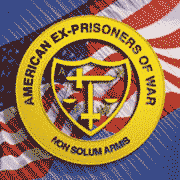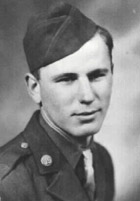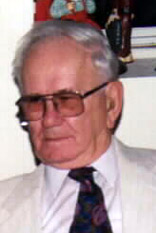
Established April 14, 1942
 |
American Ex-Prisoners of War
A not-for-profit, Congressionally-chartered veterans’ service organization advocating for former prisoners of war and their families.
Established April 14, 1942 |

Dick ''Butch'' Behrens 1942 |

Dick after 52 years of freedom |
|
| Last Name | First Name, Middle Init. | Nickname |
| Spouse | City | State, Zip |
| Conflict — Theatre | Branch of Service | Unit: |
| Military Job | Date Captured | Where Captured |
| Age at Capture | Time Interned | Camps |
| Date Liberated | Medals Received | |
| After the War ... | ||
The Faid Pass battle started on February 14th and we were captured several days later. We were rounded up somewhere east of Sidi bu Zid and marched to Sfax then wound up in Tunis and were flown across the Med to Naples and held for several days in a compound at Capua. We went by train over Brenner Pass to Stalag 7V11A at Mooseburg where we were "processed" for two or three weeks. We got back on the 60's and 8's and went north to 111B at Firstenburg (Furstenburg) which is south of the other Frankfurt on the Oder River. I think we got there in March.
111B had been a holding place for Russian prisoners whom the Germans brutalized, and the same personnel were pretty rough on us until they were replaced by more humane types. Not that these guardS were nice people, only a little less brutal. They hit us around a lot at first, but there is nothing like a 'butt stroke' or two to make us realize we were no longer in control.
The next three months were not good. Then we began to receive Red Cross parcels, two men to a parcel when times were good, but there were some long time between parcels. A 'parcel' had a can of Spam or corned beef, a pound can of powdered milk, 1 pound off butter, soap, 6 oz of liver pate', crackers, sugar, salt and instant coffee. Also there would be five packs of cigarettes. They were as good as money for trading with the guards and French prisoners, who were nearly free around the camp.
We were at 111B until January of 1945. We had to hit the road because the Russians were moving west. We did a midwinter march to 111A, this was not a fun trip, thousands of Germans were doing the same thing. In six or seven days we arrived in 111A which was a hellhole. Three thousand men or so, and two water faucets. The Russians 'liberated' us and many of us walked to the Elbe River and the American lines. On the way my kidneys began to fail but I was fortunate to get to a hospital in France before I collapsed. I spent a month there, came home on a hospital ship and spent a year at Walter Reed Hospital. I left there fully recovered. A very happy ending.